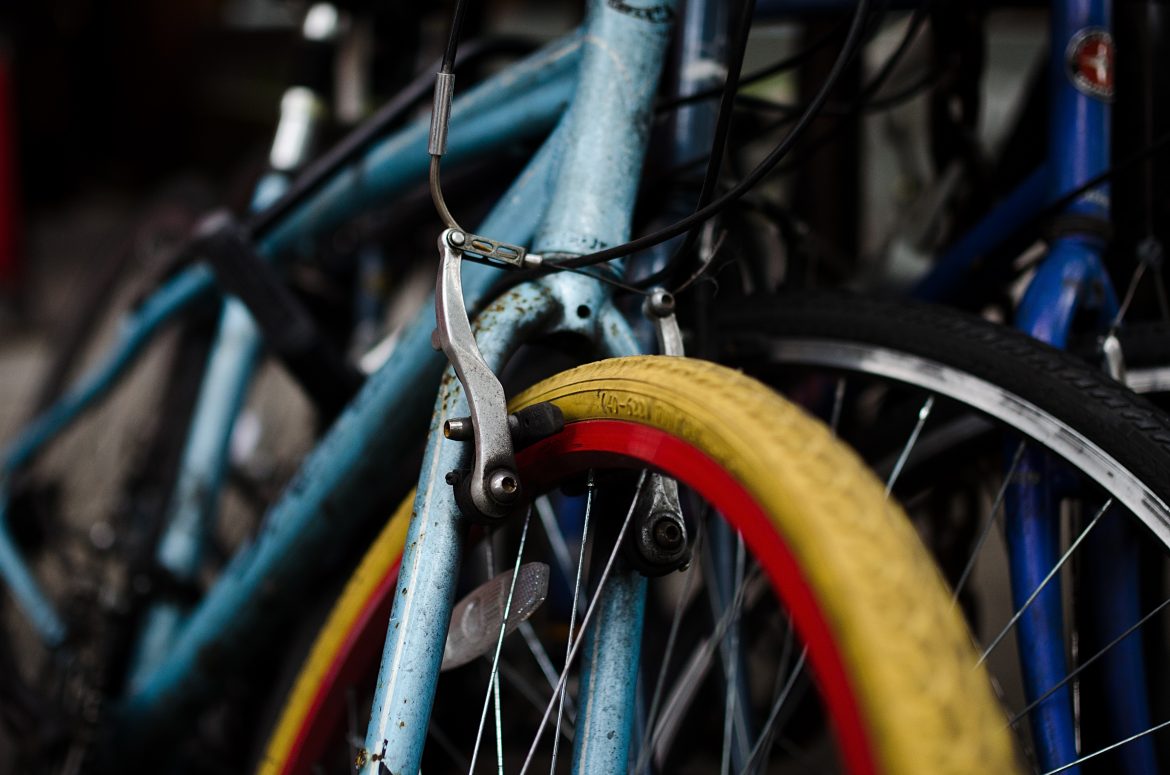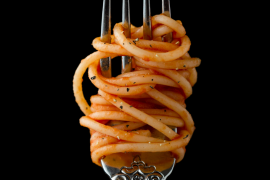HARRIET WHEELED HER BIKE OVER TO THE CEDAR SHED BESIDE THE CABIN and propped it against the shed’s gray shingled wall, spotted with holes bored by the bees who call themselves carpenters. She took a long step back just short of the wall of tall grass that lined the yard, and squinted her eyes to inspect the bike. She’d found it that morning at a flea market held in a field of dirt just north of Wiscasset. The seller told her it was a red 10-speed Raleigh, likely built sometime in the 80s. A woman with swinging jowls and a too-green linen suit scoffed at Harriet when she loaded it into her dad’s Subaru. “That machine isn’t roadworthy,” the woman said, “and aren’t you too young to drive a car?” Harriet ignored the green woman and peeled out of the lot, sending up as much dirt into the air as the Subaru’s old tires could.
Looking at the bike in the safety of her woods, Harriet could see it needed some rusty bolts replaced, and maybe even a new chain, but all in all it wasn’t a terrible bike. Thirty years ago, it may have been quite the enviable piece of aluminum.
She lifted herself onto the narrow saddle and pedaled it up and down the cabin’s 132-footstep long dirt driveway, then off into the field. The tires rumbled over the uneven ground, knocking into roots and flattening a thin trail in the tall grass, and Harriet wondered if passerby would wonder what kind of snake had slithered along through here. The tufted heads of yellow grass in the field tickled her cheeks and stuck to her lips, smeared with vaseline. She took a moment to worry about ticks, but then decided to forget them. The gears rattled whenever she tried to shift. The chain clicked constantly. But the brakes worked, and the wheels looked straight, so she figured herself pretty lucky.
Harriet rolled back into the yard and parked the bike against the shed. She yanked open the door by putting her finger in the hole left by a bullet shot by some bored thief a few winters ago. The shed was about the length and width of a bathtub, and a few feet taller than Harriet’s hands could reach. It was built by her dad decades ago, and he had been a tall man.
Harriet pushed around tools on the shelves, unsure what she was looking for. Something to make the bike less squeaky, more shiny. A wrench was always a good place to start. She stood on her toes and put her hands on a group of tall pine boards leaning against the workbench. The grey mud caked onto the boards crumbled against her fingers. That’s when she heard the buzzing.
She looked up to see a swirl of long black wasps circling the roof of the shed. Harriet’s limbs flew out like a starfish and knocked all the boards to the ground just as a wasp found the center of her cheek. The stinger tore through her skin and it throbbed, swelling bigger and bigger like it would swallow her whole head. As she stumbled out of the shed and fell to the ground, Harriet wondered if she was allergic to wasps just as her dad had been.
About ten years back, she almost drowned after she got stuck in the mud of the cabin’s tidal cove. A cousin had dared her to walk out there at low tide, and Harriet didn’t need much convincing to try. They’d been sitting out there watching and bothering the clammers working the cove until the river was in too high. The clammers had stood out there in the mud, safe and sound, their deep footsteps clearly marking their tracks from their anchored skiff at the cove’s edge. The cousins figured that if the clammers could stand out there, then kids could stand out there, too.
Harriet stomped out across the mud in her plastic sandals and wondered why she hadn’t done this sooner. The smooth mud squished between her sandal and the bottom of her foot while bubbles shot up from the clams she disturbed. She thought there was plenty of time before the tide came in.
She yanked her feet out and moved further from shore until she got stuck, the mud swallowing her legs above the ankles. The rest of the cousins sat on the rocks and laughed and laughed, and Harriet laughed too, but as the river began to pour into the far end of the cove, they saw that she would soon be covered by the salty river if someone didn’t stop laughing and get her out of the mud.
Harriet’s dad appeared from the path in the woods, in the same blue jeans and the same brown shirt he always wore, his dark face bright in the setting sun. Harriet waved to him and tried to laugh. His eyes widened, but he just turned around and disappeared back down the path toward the cabin.
“Dad?” Harriet said quietly, wondering why he had run away from her, why he had left her when she was about to drown.
The cousins exchanged silent glances, but no one laughed anymore. Harriet started to panic, thinking the last sight she had of her family would be from underneath the waves.
She started to cry, and so did some of the cousins. Her legs were so tired from pulling at the mud.
Just as one of the wiser cousins began the ascent back to the cabin to find help, Harriet’s dad reappeared through the woods, a pile of long pine boards stacked under his arms. He yelled at the cousins to help him, and they scrambled over the rocks to pass the boards down to him at the water’s edge. He threw a board down on the mud, stepped onto it, then laid down another and another until a bridge was formed to reach his daughter.
The water of the incoming tide poured into the holes Harriet’s feet were stuck in, pulling her further down. Her dad grabbed her under the shoulders and heaved her out of the sinkhole onto the boards. They walked back to the shore together, carefully, her feet slipping on the boards but never enough that they got stuck in the mud.
Once they were back on shore, all of the cousins, Harriet included, laughed and laughed as they watched the tide come in and swallow the bridge.
Harriet couldn’t remember if she made it out with her sandals still on, but she doubted it. She wondered if they were still buried in the mud there somewhere, the home for a happy family of clams, or whether they had been sucked out of the mud during their first tide change, to be carried downriver into the open ocean, where they sunk to the floor or perhaps floated far out to sea, caught in the Gulf Stream, spun around the waves and under whales and past giant sunken ships until they finally landed on a tropical shore thousands of miles away.
Five minutes passed. Beside her throbbing cheek, an ant scurried over its hill. A fly buzzed around her nose. Harriet was glad to see she was still alive.
She pushed herself up off the ground, grabbed a can of bug spray from the shed’s floor, and sprayed the poison into the shed until the can was empty and the buzzing stopped.
Harriet threw the can to the ground, kicked the shed door closed, and hopped on her bicycle, wondering how far she could ride before it gave out.
SARAH LUKIANOV is an educator and writer on the coast of Maine who lives with her husband, three-legged Siamese cat, and an ever-changing cast of wildlife creatures who also wish to make her land their home. She is an advocate for type one diabetes research and access to medication. She can be found on Instagram at @sarahluks.
Like what you’re reading?
Get new stories or poetry sent to your inbox. Drop your email below to start >>>
OR grab a print issue
Stories, poems and essays in a beautifully designed magazine you can hold in your hands.
GO TO ISSUESNEW book release
I’ll Tell You a Love Story by Couri Johnson. Order the book of which Tim Jeffries said, “Surprising in their originality, filled with broken wisdom, and with a refreshing use of language and imagery, these are stories to savour and mull over one at a time but which add up to a satisfying whole.”
GET THE BOOK



